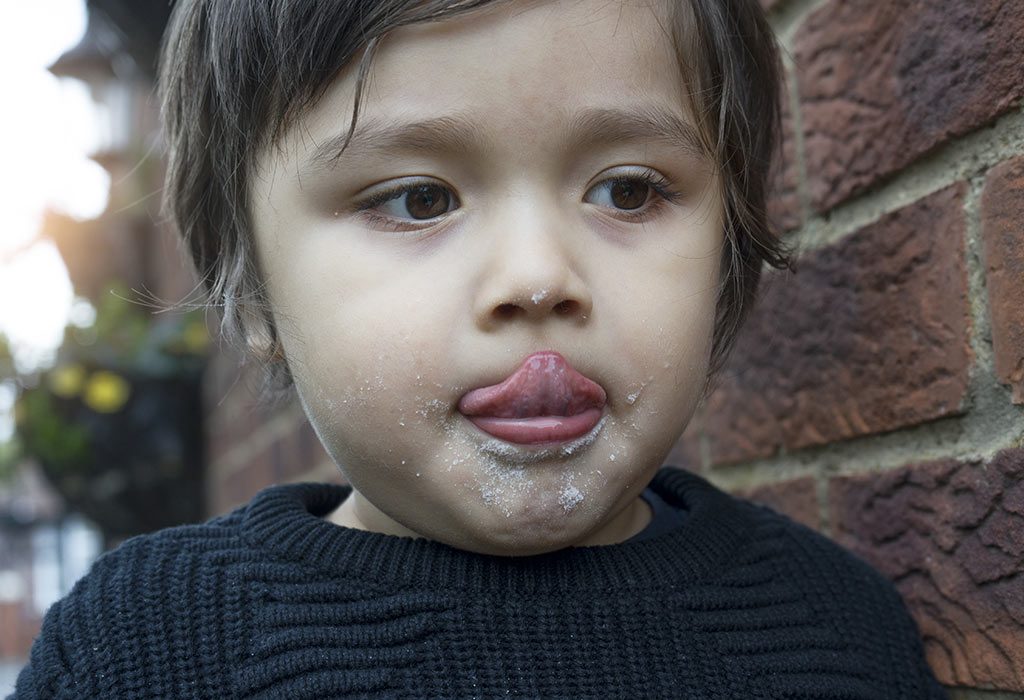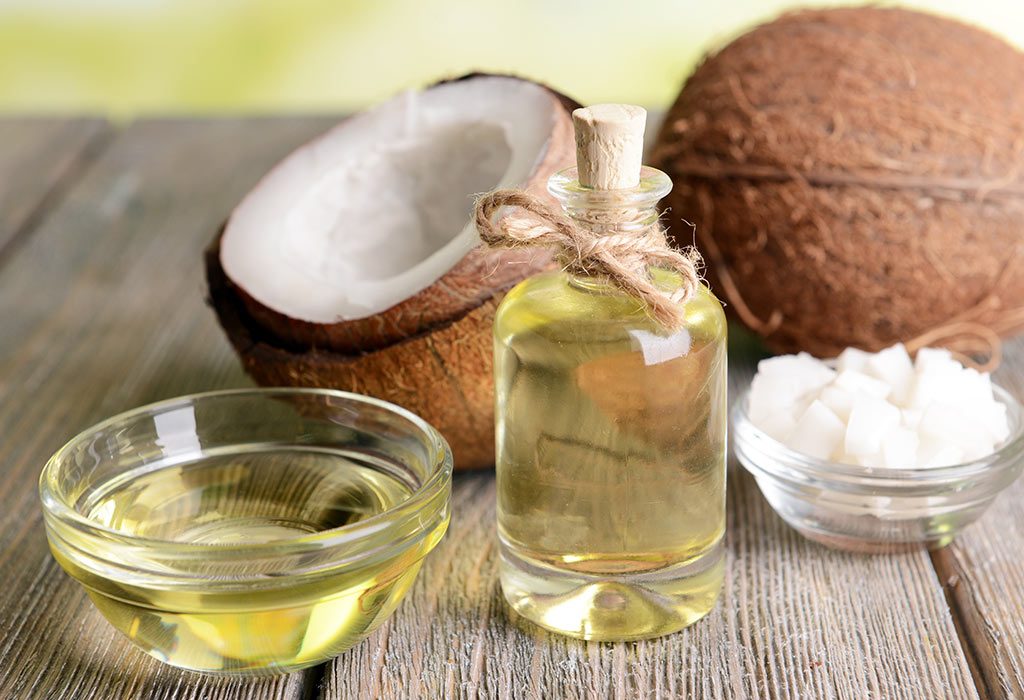In this Article
- Should You Worry If Your Baby Has Cracked Lips?
- What Are the Causes of Chapped Lips in Babies?
- Do Babies Get Chapped Lips Due to Breastfeeding?
- What Are the Signs of Chapped Lips in Infants?
- How Can You Treat Chapped Lips in a Baby?
- What If Your Child Has Chronic Chapped Lips?
- How to Prevent Cracked Lips in Infants
As the weather starts changing, it brings with it differences temperature and humidity levels. This can result in days where your little one’s skin and lips can get dry, which further leads to cracked and chapped lips.
Should You Worry If Your Baby Has Cracked Lips?
For young babies – especially newborns – dry lips should always be a cause for concern. If ignored for too long, dry lips can end up cracking or splitting and also develop into sores.
One of the reasons for cracked lips in babies is the habit of the baby to constantly suck on his lips. However, cracked lips is a strong sign of dehydration in your child. Weather changes and exposure to the wind can often cause this as well, but if your child tends to breathe from his mouth more than his nose, that could cause the lips to be chapped as well.
What Are the Causes of Chapped Lips in Babies?
The reasons for an infant’s dry lips can vary from personal habits to environmental conditions.
1. Dehydration
The causes of dehydration are two-fold: one is mostly dry weather that can pull moisture out of the baby’s skin, and the second is being in weather that can keep the baby perpetually sweaty. To add to that, if the number of feeds a baby needs is not up to the mark, the body will not be hydrated enough. This can lead to dry lips. Some signs of dehydration in babies are:
- Sunken eyes
- Crying with no tears
- Cold and blotchy hands and feet
- A fast heartbeat
- A ‘soft spot’ on the baby’s head
2. Deficiency in Nutrition
The presence of chapped lips is another sign that indicates the baby’s current nutrition not being enough. If a newborn baby has been diagnosed with lower levels of certain nutrients in the body, his lips will fail to retain moisture. This is often aggravated by a baby having low immunity.
3. Reaction to Allergies
Sensitive skin can react to a lotion or cream, or even the cloth that is used to drape him. If the mother uses a certain chapstick and tends to kiss the child often, that, too, could trigger an allergy.
4. A Tendency to Breathe via the Mouth
Mouth breathing allows air to be around the lips constantly. This air invariably picks up any moisture that it finds in its path. The presence of an illness that involves a blocked nose often leads to mouth breathing in babies and causes cracked lips, making them uncomfortable.
5. Fluctuations in the Weather
Babies need to be in a safe and controlled environment, especially when they are just born because their skin is not used to the extremities of the weather. Hot summers, cold winters or windy days can allow moisture to soak from every source, leaving your little one with chapped lips.
6. Sucking or Licking of the Lips
The tendency to keep sucking on something is quite strong in the initial weeks. This causes babies to keep poking out their tongue and sucking on their lips constantly. The saliva in the mouth evaporates from the lips gradually and leaves them dry. This repetitive cycle causes cracks to appear on them.

Do Babies Get Chapped Lips Due to Breastfeeding?
A newborn spends the maximum amount of time feeding off the breast, and that may seem to have a connection with the presence of cracked lips. But feeding is not what causes the lips to be chapped. Breast milk, on the contrary, can help chapped lips heal. If the baby latches well and gets enough feeds throughout the day, the chances of dry lips actually seem to reduce.
What Are the Signs of Chapped Lips in Infants?
For a newborn’s chapped lips, the symptoms can be:
- Lips being predominantly dry as compared to your own
- Cracks appearing on the surface of the lips that may go deeper
- The skin around the lips starts getting darker in colour
- The lips are sore and have a slightly reddish colour to them
- The cracks are intense and cause blood to seep out at times
How Can You Treat Chapped Lips in a Baby?
In the case of babies, there are certain remedies you can use to bring speedy relief and alleviate discomfort.
1. Petroleum Jelly
Made from lanolin, this acts as a potent moisturiser for your little one’s lips, helping heal the cracks faster. The presence of lanolin makes it a gentle healer and is absolutely safe, even if your baby ends up licking his lips and consuming it in that fashion.
Take a tiny bit on your finger and slowly apply it on your infant’s lips. Try using these at night when the baby sleeps so that it stays longer and the lips get the time they need to heal.
2. Coconut Oil
An age-old remedy, many parents opt for using the oil since it is readily available at home. The main constituent of the oil is lauric acid which brings about the healing and doesn’t affect the baby. Disinfect your finger and dab a little oil on it. Rub it on baby’s lips and repeat multiple times whenever dry.

3. Breast Milk
This is the safest and the most natural way to heal cracked lips. Use your nipple to gently put some milk on his lips or dab it with a finger. Don’t rub it on his lips. The milk allows the lips to be hydrated and the natural ingredients accelerate the healing.
What If Your Child Has Chronic Chapped Lips?
Chronic chapped lips in a baby might indicate a nutritional deficiency or even extra consumption of vitamin A( leads to dry skin). There are rare instances where babies contract Kawasaki disease – a condition that causes inflammation and fever and is prevalent in babies between the ages of 6 months and 2 years. However, dry lips, in that case, are accompanied by other symptoms including fever and red eyes. So if that seems to stay for longer periods, get your child checked.
How to Prevent Cracked Lips in Infants
Prevention is better than cure, more so in the case of infants. To prevent cracked lips in infants, maintain an optimum temperature at home and use a humidifier if needed. Cover your child in proper clothes and protect him from the sun or strong winds. Also, make sure to feed your baby more often during hot weather to keep the baby’s hydration levels optimum.
Chapped lips might be a very common condition for grown-ups. But the sensitive nature of the baby’s skin and the dependency on feeding through the mouth can make it quite painful and uncomfortable for him. Treating this in the right way the moment the signs appear can help it from getting more severe.
Resources and References: Medical News Today









